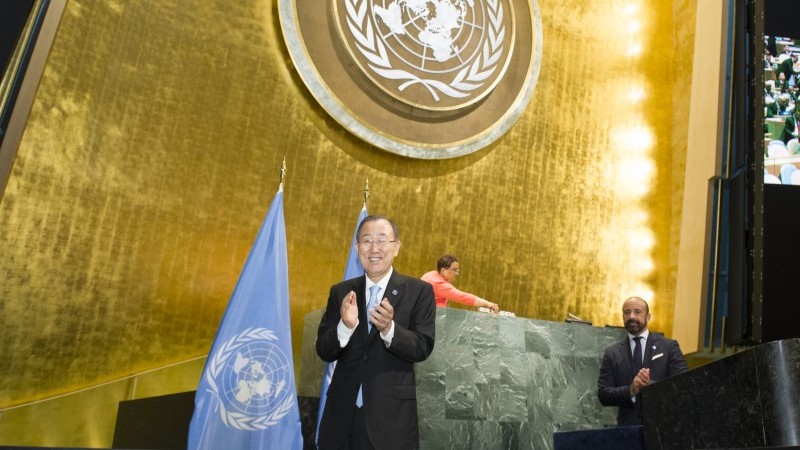The UN promised at least 20 countries would formally join the Paris climate deal this week in New York, and it over-delivered.
At a brisk ceremony on Wednesday morning, 31 states filed their paperwork, plus Ukraine snuck its in a day early, bringing the total to 60. Collectively, they pass the first threshold for bringing the agreement into force, but on 48% of the world’s emissions fall short of the 55% second threshold.
Who will claim the glory of getting the deal over the line? Well, after a gentle public shaming, the EU is picking up the pace and will ratify next month, according to top official Miguel Arias Canete. A dozen more leaders said in video messages they will do the necessary in 2016, including Australia, Canada and South Korea.
What’s it got to do with US?
It is a triumph of multilateral diplomacy, to those in the business. In the hyper-polarised world of US politics, though, it will scarcely register with the Donald Trump camp, which is gaining in the polls.
The climate sceptic Republican presidential candidate was an unspoken presence at the typically upbeat events of Climate Week NYC, reported Ed King.
Democrat Hillary Clinton, the presumed greener choice, has gone quiet on the subject since winning the endorsement of climate hawkish rival Bernie Sanders, Karl Mathiesen spotted. It may make tactical sense to win over swing voters, but millennials are not impressed.
With no more elections to run, incumbent Barack Obama is not so shy. He used his valedictory speech to the UN for a lengthy defence of global cooperation, calling for a scaling up of climate investment. Oh, and he ordered 20 federal agencies to weave climate risk analysis into national security planning.
Climate Week NYC round-up
- More than 100 countries called for a rapid phase-out of potent warming HFC gases (used in air conditioning) to be agreed at a summit in Kigali next month. Donor countries and philanthropic organisations are promising US$80 million to help poorer countries make the switch to safer alternatives. The one to convince is India, which is seeking a slower transition to protect its chemical industry.
- Singapore, Japan, Malaysia, Kenya and the United Arab Emirates announced they will volunteer to take part in a global carbon offsetting and reduction scheme, taking the number of countries committed to an initial pilot from 2020 up to 55. The EU28, China, Australia, US, Canada and Mexico are among those already signed up.
- Toronto, Mexico City and Guangzhou are among 35 cities shortlisted for C40 climate action prizes. The winners will be revealed on 1 December.
- Apple became the highest profile recruit to the RE100 campaign, aiming to get all its energy from renewables. Nine other multinationals joined this week.
- Four companies signed up to the lesser known EP100 movement, launched earlier this year to promote energy productivity, including Dalmia Cement and Chinese LED manufacturer Hongbo Group.
- The British Commonwealth launched a Climate Finance Access Hub in a bid to cut through red tape that can prevent funds getting to worthy projects.
Peer pressure
The US and China have graded each other on efforts to phase out “inefficient” fossil fuel subsidies. Seen as a no-brainer by economists, reform has proved difficult in practice.
While it offers no easy solutions, the exercise is something of breakthrough for transparency, shedding light on the stumbling blocks. In the US, it is Congress. In China, it is a lack of clear data and internal political tensions.
Whither 1.5C?
“This is quite awkward because the politics has moved faster than the science.” Joeri Rogelj, researcher at IIASA Vienna, summed up the challenge succinctly at a conference on the 1.5C international climate goal in Oxford.
Some of the finest minds in academia grappled with the impacts of 1.5C warming and whether it is feasible to halt rising temperatures at that level. Unfortunately, Climate Home couldn’t make it (New York beckoned), but the excellent Carbon Brief team had it well covered.
Dr Joeri Rogelj from @IIASAVienna: “This is quite awkward because the politics has moved faster than the science.” #1point5 #climate
— Leo Hickman (@LeoHickman) September 22, 2016
Fossil fools
Underlining the scale of the problem was analysis from Oil Change International, which showed existing coal, oil and gas sites will blow the 2C threshold if fully exploited. Any new fossil fuel development is incompatible with the 1.5C or 2C goal, the think tank warned.
Killer haze
A study from Harvard and Columbia universities estimates the death toll of Indonesia’s raging 2015 forest and peat fires at 100,000, based on the known health impacts of smoke exposure. The research piles pressure on Jakarta to tackle the slash-and-burn land clearance behind what has become an annual health, environmental and diplomatic crisis.
Africa files
The decline of mangroves on Kenya’s coastline is a worry for fishing communities and the climate, reports Lou Del Bello from Nairobi, in the latest of our Africa files series.
